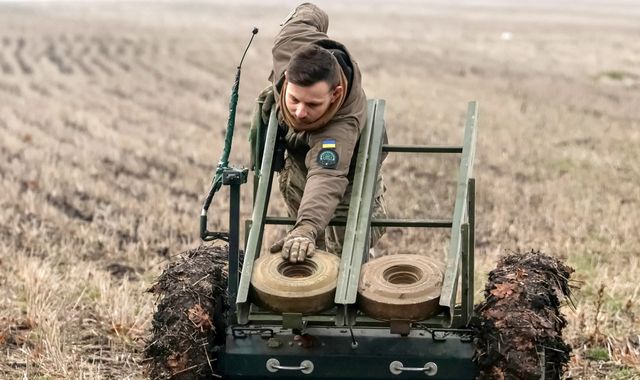
Calls are growing for the UK to withdraw from the treaty banning the use of landmines.
Nations in eastern Europe, including Poland and Finland, have signalled they will leave the 1997 Ottawa Treaty so they are allowed to lay mines amid an increasing threat from Russia and Belarus.
The UK government remains committed to staying part of the Ottawa Treaty, but some want it to be abandoned or at least reviewed.
Politics latest: PM will speak to world leaders over the weekend
In a debate in the House of Lords, several peers made the case for the UK being more open to the use of landmines, including the Duke of Wellington, former soldiers and aid workers and the grandson of prime minister Clement Attlee.
Former defence secretary Sir Ben Wallace has also called for the UK to withdraw from the treaty.
Lord Robathan, who was an officer in the Coldstream Guards and also in the SAS before becoming a Conservative MP, recalled a vehicle he was in was hit by a mine in Iraq.
The Ottawa Treaty was signed in late 1997, with the UK as one of the initial members. Nations that are not signatories include Russia, China, Iran, India, North Korea, South Korea and the United States.
According to the UN, more than 40 million mines have been destroyed since the treaty came into force and "vast" previously mined areas have been cleared.
He described the Ottawa Treaty as "window dressing" - adding that British soldiers "should have" the defence of being able to use landmines should the UK enter a war.
"I have seen UK soldiers maimed in Afghanistan and Iraq in the recent past.
"This convention does nothing for them or for peace. It takes away one line of defence from our own soldiers," he said.
Lord Robathan also spoke of his work clearing landmines.
The Duke of Wellington, a descendant of Arthur Wellesley who won the Battle of Waterloo, told the chamber how he was a trustee of the HALO Trust that worked with Princess Diana on de-mining.
But 25 years after the Ottawa Treaty was signed, "the military situation has changed unimaginably", the duke said - claiming that potentially millions of mines have been laid by Russia.
The duke said he wanted changes to how the UK interprets the treaty.
"I humbly suggest to the minister that the government seek to preserve the principles of the Ottawa convention but attempt to modify it to take account of the new technologies and the transformed military situation in Europe," he said.
The Ottawa Treaty also prevents the UK from producing, selling and transferring mines to other nations.
Read more on war in Ukraine:
Michael Clarke answers your questions
Trump running out of patience with Putin
Earl Attlee spoke of his time running an NGO in Rwanda and seeing the impact of mines there.
But he said his "counsel" is to support a research paper from the Policy Exchange think-tank calling for Ottawa to be "jettisoned", alongside the treaty banning cluster munitions.
? Click here to listen to Electoral Dysfunction on your podcast app ?
Among those calling for the ban to remain in place were anti-landmine campaigner Lord Dubs, as well as the Lord Bishop of Southwark and Lady Bennett of Manor Castle.
Friday 4 April marks International Mine Awareness Day, and barrister Ben Keith of Campaign For Landmine Justice used the event to call for action to be taken against nations using the weapons.
Mr Keith told Sky News that countries using mines and companies making them should contribute to a UN fund for victims.
He said: "Victims need comprehensive support including medical care, psychological counselling, prosthetics, vocational training, and social reintegration services.
"Their needs are lifelong, but current funding mechanisms are fragmented, inconsistent, and vastly insufficient."
Foreign Office minister Baroness Chapman of Darlington responded on behalf of the government.
She said the UK has "engaged" closely with the nations that are withdrawing from the Ottawa Treaty to understand their decisions.
The minister said: "The government continue to believe that we can advance both our own national security and that of our allies, and the vital humanitarian norms that protect civilians, which these treaties represent.
"Nonetheless, we cannot ignore the fundamental change in the geopolitical context that has taken place, and I am grateful to all noble Lords for raising these questions."

(c) Sky News 2025: Growing calls for UK to withdraw from treaty banning landmines


 Local news content from CItiblog - read more at
Local news content from CItiblog - read more at  'Will the PM side with parents or tech bros?': Labour peer demands action on children's smartphone safety
'Will the PM side with parents or tech bros?': Labour peer demands action on children's smartphone safety
 Trump has acted for his country, I will act in Britain's interests, says Starmer
Trump has acted for his country, I will act in Britain's interests, says Starmer
 Small boat crossings halted by gusty conditions despite sunny start to spring
Small boat crossings halted by gusty conditions despite sunny start to spring
 Government will miss its own deadline to bring in Hillsborough Law
Government will miss its own deadline to bring in Hillsborough Law